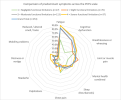What Can We Learn Four Years On? A Multi-Centre Service Evaluation Exploring Symptoms, Functional Impact, Recovery and Care Pathways in Long Covid
BACKGROUND
Long Covid (LC) is associated with long-term health impacts that require ongoing support from healthcare services. We aimed to gain insights into patients perceptions of their ongoing symptoms of LC, the effect on daily living and vocation, perceptions of what helps with LC recovery, as well as LC care pathways and ongoing care needs.
METHODS
An online survey was sent to 513 participants who had used one of three LC services across England and Wales between 2020 and 2024. Participants were invited to share their experiences. We employed a mixed-methods approach for data analysis, synthesising findings from quantitative and qualitative data. All data shared between sites was de-identified.
RESULTS
269 (52.4%) participants completed the survey. The mean age was 52.7 (sd ± 12.0), 69.1% female and 55.0% were White-British. The mean duration since initial SARS-CoV-2 infection was over 3 years (1204.4 ± 275.7 days). The Post-Covid Functional Status (PCFS) scale indicated that most participants (94.1%, n = 253) had not fully recovered. When employing a global rate of change scale, 39.0% (n = 96) of 246 responders indicated they are still making improvements with respect to their recovery; 40.7% (n = 100) had plateaued, and 20.3% (n = 50) reported a worsening trajectory. Those with ongoing symptoms described fatigue 83.0% (n = 210), cognitive dysfunction 58.5% (n = 148) and breathlessness or wheezing 43.9% (n = 111) most frequently. Of those who responded, 20.8% (n = 48) were ‘working as prior to their initial LC infection and 25.5% (n = 59) were currently ‘unable to work. Almost half (44.3%; n = 86) were no longer receiving care whilst also reporting unmet care needs. In total, 62.7% (n = 126) of participants indicated unmet care needs, and qualitative analysis indicated five overarching domains as having an important impact on long-term LC recovery and ongoing healthcare needs. These were Living with LC, LC interventions and recovery, Approach to the delivery of care, Insufficient support and Suggestions and improvement.
CONCLUSION
This study indicates the extent to which individuals continue to experience ongoing symptoms of LC, including aspects related to recovery and vocational impact, highlighting the potential widening gap between the ongoing need to support those living with LC and the limited provision of care.
PATIENT OR PUBLIC CONTRIBUTION
The survey was co-produced with Experts by Experience, who had previously attended an LC service and members of the Patient Advisory Group within the Locomotion Consortium. Collaboration and involvement continued throughout the study, including analysis, interpretation and writing processes.
CLINICAL TRIAL REGISTRATION
Study registration details are available at ClinicalTrials.gov: NCT05057260 and ISRCTN: 15022307.
Web | PDF | Health Expectations | Open Access
Cassie Lee; Paul Williams; Amiad Abrahams; Julie Darbyshire; Helen E Davies; Johannes De Kock; Umut Esmer; Samantha A Jones; Vicky Newey; Janet Scott; Nikki Smith; Darren Winch; Harsha Master; Sarah Elkin
BACKGROUND
Long Covid (LC) is associated with long-term health impacts that require ongoing support from healthcare services. We aimed to gain insights into patients perceptions of their ongoing symptoms of LC, the effect on daily living and vocation, perceptions of what helps with LC recovery, as well as LC care pathways and ongoing care needs.
METHODS
An online survey was sent to 513 participants who had used one of three LC services across England and Wales between 2020 and 2024. Participants were invited to share their experiences. We employed a mixed-methods approach for data analysis, synthesising findings from quantitative and qualitative data. All data shared between sites was de-identified.
RESULTS
269 (52.4%) participants completed the survey. The mean age was 52.7 (sd ± 12.0), 69.1% female and 55.0% were White-British. The mean duration since initial SARS-CoV-2 infection was over 3 years (1204.4 ± 275.7 days). The Post-Covid Functional Status (PCFS) scale indicated that most participants (94.1%, n = 253) had not fully recovered. When employing a global rate of change scale, 39.0% (n = 96) of 246 responders indicated they are still making improvements with respect to their recovery; 40.7% (n = 100) had plateaued, and 20.3% (n = 50) reported a worsening trajectory. Those with ongoing symptoms described fatigue 83.0% (n = 210), cognitive dysfunction 58.5% (n = 148) and breathlessness or wheezing 43.9% (n = 111) most frequently. Of those who responded, 20.8% (n = 48) were ‘working as prior to their initial LC infection and 25.5% (n = 59) were currently ‘unable to work. Almost half (44.3%; n = 86) were no longer receiving care whilst also reporting unmet care needs. In total, 62.7% (n = 126) of participants indicated unmet care needs, and qualitative analysis indicated five overarching domains as having an important impact on long-term LC recovery and ongoing healthcare needs. These were Living with LC, LC interventions and recovery, Approach to the delivery of care, Insufficient support and Suggestions and improvement.
CONCLUSION
This study indicates the extent to which individuals continue to experience ongoing symptoms of LC, including aspects related to recovery and vocational impact, highlighting the potential widening gap between the ongoing need to support those living with LC and the limited provision of care.
PATIENT OR PUBLIC CONTRIBUTION
The survey was co-produced with Experts by Experience, who had previously attended an LC service and members of the Patient Advisory Group within the Locomotion Consortium. Collaboration and involvement continued throughout the study, including analysis, interpretation and writing processes.
CLINICAL TRIAL REGISTRATION
Study registration details are available at ClinicalTrials.gov: NCT05057260 and ISRCTN: 15022307.
Web | PDF | Health Expectations | Open Access

